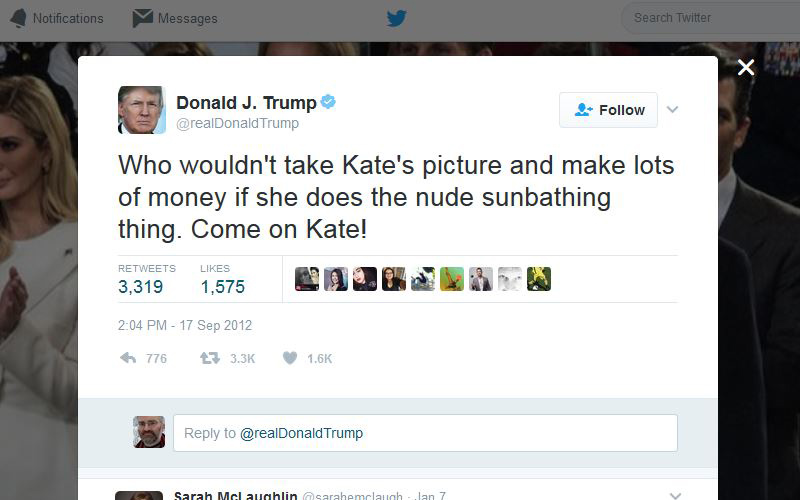U.S. president Donald Trump’s state visit to Britain, announced in Washington last week by British Prime Minister Teresa May, is already mired in controversy.

A petition urging the British government to cancel the state visit had passed 1.4 million signatures by mid-Monday, (only 100,000 triggers a parliamentary debate), but the British prime minister’s office has said that won’t happen.
A state visit to Britain normally involves a major role for the royal family: the Queen will formally greet the visitor and host a banquet in their honour, for example.
However, crude sexual comments Trump has made about Princess Diana and Catherine, the Duchess of Cambridge, may cast a chill over the pomp and circumstance.
In 2012, for example, Trump tweeted support for a French magazine that published topless photos of Middleton sunbathing:
Six people, three of them photographers, were charged with breaking French privacy laws; their trial begins in May.
During the U.S. election campaign, Buzzfeed uncovered two recordings of Trump on the Howard Stern show making crude references to Princess Diana.
The first aired in 1997, in the aftermath of her death.
“You could have gotten her, right?” Stern asks Trump. “You could have nailed her.”
“I think I could have,” Trump responds.
“I thought she was supermodel beautiful. There were times when she didn’t look great, and times when she looked better than anybody in the world. She had the height, she had magnificent skin.”
Pressed by Stern, Trump denied that he had “pleasured himself to her”.
READ: U.S. embassy cables detail foreign dismay at Donald Trump’s immigration order
The 20th anniversary of Diana’s death is on August 31 this year.
In 2000, Stern interviewed Trump about what was referred to as Trump’s ‘Top 10 beautiful women list’. “I believe that this list is an important list that women will want to be on,” Stern said. Trump rated Princess Diana, who at that point had been dead for three years, as number 3.
“You would have slept with her?” Stern asks.
“Without even hesitation,” Trump says. “She had the height, she had the beauty, she had the skin, the whole thing. Crazy, but these are minor details.”
READ: Donald Trump defends travel ban, claiming it is not about religion
The comments put the younger princes in an impossible position.
If he participates in the visit, Prince William, the Duke of Cambridge, will have to be polite to a man who has made crude sexual comments about not only his wife, but also his mother, who died when he was 15. (Prince Harry was 12.)
But royals other than the Queen don’t have to be part of a state visit, says retired University of Toronto professor Richard Toporoski, who is an expert on the monarchy.
“(William) may absent himself. The Prince of Wales has absented himself from events in which representatives of the People’s Republic of China were present. That’s a possible solution.”
“Everybody but the Queen has a certain amount of leeway. The sovereign herself seems not to have that leeway.”
On the other hand, the Telegraph reported last week that the Duke and Duchess of Cambridge would have a significant role in the Trump visit.
The Queen doesn’t really get a choice about who gets a state visit to Britain. Those decisions are made by the prime minister of the day.
Sometimes, the needs of state have forced her to host controversial leaders:
Romanian president Nicolae Ceausescu, who ran one of the most oppressive of the Warsaw Pact states, got a full state visit in 1978. Britain hoped that Ceausescu could be convinced to create some distance between Romania and the Soviet Union.
“She was clearly uncomfortable with the government’s decision to invite the Romanian dictator, so much that she took drastic steps to avoid meeting him any more than necessary,” says a 2011 biography of the Queen.
READ: Donald Trump’s immigration orders leave U.S. stock futures low
Widely hated in his country, Ceausescu was executed in 1989, at which point Britain took away the knighthood that had been given him in 1978.
“When the man was the president of Romania, he was acceptable on the international level, so she treated him as any other guest,” Toporoski says. “I don’t know what went on personally.”
Ugandan president Idi Amin, who seized power in a coup, made two state visits to Britain, in 1971 and 1972.
His regime killed hundreds of thousands of people; Britain broke off diplomatic relations in 1977. Amin awarded himself a title which included the phrase “Lord of All the Beasts of the Earth and Fishes of the Seas and Conqueror of the British Empire in Africa in General and Uganda in Particular.”
He was deposed in 1979.




Comments